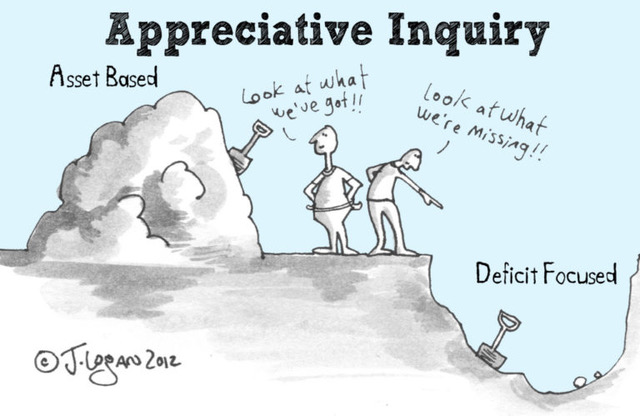The Creation in Common team embraces positive, strengths-based concepts like Appreciative Inquiry. That’s why Project Associate Laura Venhaus has been compiling a community-building bibliography of models and resources to inform our work.

Appreciative Inquiry is an assets-based approach to organizational or community development. A core belief of the approach is that positive questions lead to positive change. So the process begins by asking what strengths exist, what resources are already in place, and what community members hope or wish for their community. It doesn’t ignore problems, troubles, or issues. Instead the process starts with what’s working, rather than what’s not.
“We’re so used to asking what’s wrong in every situation,” explains Laura. “But when you start with the opposite question—what’s right?—it’s a lot more affirming. You begin to see your organization or yourself in a different light. And you begin to see what could be possible with your existing strengths.”
“We’re so used to asking what’s wrong in every situation,” explains Laura. “But when you start with the opposite question—what’s right?—it’s a lot more affirming. You begin to see your organization or yourself in a different light. And you begin to see what could be possible with your existing strengths.”
Although we’re referring to it as the Appreciative Inquiry Bibliography, the document actually looks at a variety of other strengths-based research models as well, including Sustained Dialogue, Strategic Doing, Theory U, and Appreciative Community Building.
The bibliography itself is a digital overview of strengths-based research models. It includes high-level descriptions of the varied approaches, explains how they were developed, offers examples, and provides links to papers, books and websites for further exploration.
The document was originally created for our work with Second Harvest Northern Lakes Food Bank, a client that’s doing some community and capability building. By reviewing a number of strengths-based models, we were able to come up with a hybrid model that fit our client’s needs.
Although it was initially intended for internal use, we think the bibliography can benefit others as well, including organizations embarking on community-building, organizational change, leadership development, or personal development. Creation in Common has no plans for formal dissemination, but if we’re using strengths-based language and a client wants to know more, we’re happy to pass it along.
“Strengths-based community building can really change your whole perspective,” says Laura. “And it’s a refreshing break from looking at challenges. Take a look at what’s working and what you’ve got. Chances are you’ll see things differently.”
For a copy of the bibliography, or to learn more, please email Laura Venhaus at [email protected].

